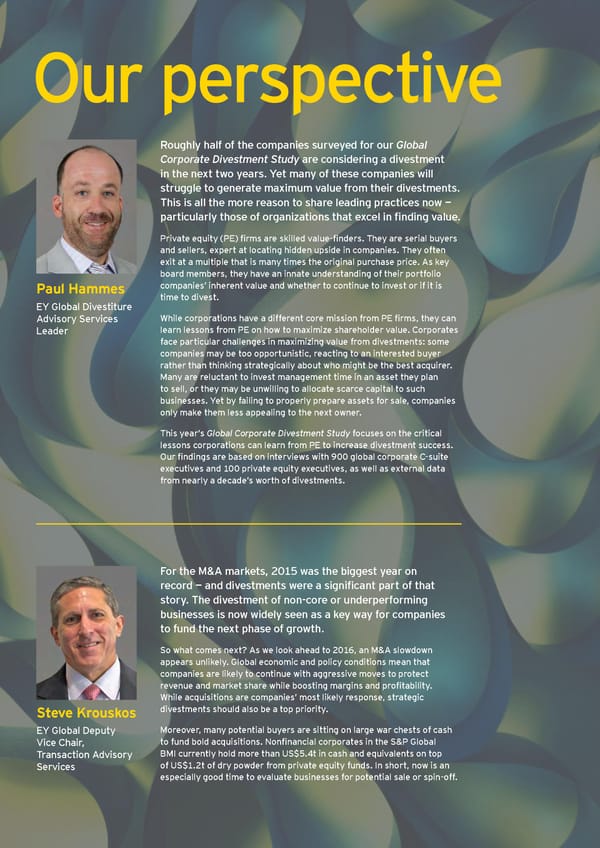Our perspective Roughly half of the companies surveyed for our Global Corporate Divestment Study are considering a divestment in the next two years. Yet many of these companies will struggle to generate maximum value from their divestments. This is all the more reason to share leading practices now — particularly those of organizations that excel in finding value. Private equity (PE) firms are skilled value-finders. They are serial buyers and sellers, expert at locating hidden upside in companies. They often exit at a multiple that is many times the original purchase price. As key board members, they have an innate understanding of their portfolio Paul Hammes companies’ inherent value and whether to continue to invest or if it is EY Global Divestiture time to divest. Advisory Services While corporations have a different core mission from PE firms, they can Leader learn lessons from PE on how to maximize shareholder value. Corporates face particular challenges in maximizing value from divestments: some companies may be too opportunistic, reacting to an interested buyer rather than thinking strategically about who might be the best acquirer. Many are reluctant to invest management time in an asset they plan to sell, or they may be unwilling to allocate scarce capital to such businesses. Yet by failing to properly prepare assets for sale, companies only make them less appealing to the next owner. This year’s Global Corporate Divestment Study focuses on the critical lessons corporations can learn from PE to increase divestment success. Our findings are based on interviews with 900 global corporate C-suite executives and 100 private equity executives, as well as external data from nearly a decade’s worth of divestments. For the M&A markets, 2015 was the biggest year on record — and divestments were a significant part of that story. The divestment of non-core or underperforming businesses is now widely seen as a key way for companies to fund the next phase of growth. So what comes next? As we look ahead to 2016, an M&A slowdown appears unlikely. Global economic and policy conditions mean that companies are likely to continue with aggressive moves to protect revenue and market share while boosting margins and profitability. While acquisitions are companies’ most likely response, strategic Steve Krouskos divestments should also be a top priority. EY Global Deputy Moreover, many potential buyers are sitting on large war chests of cash Vice Chair, to fund bold acquisitions. Nonfinancial corporates in the S&P Global Transaction Advisory BMI currently hold more than US$5.4t in cash and equivalents on top Services of US$1.2t of dry powder from private equity funds. In short, now is an especially good time to evaluate businesses for potential sale or spin-off.
 Global Corporate Divestment Study Page 1 Page 3
Global Corporate Divestment Study Page 1 Page 3